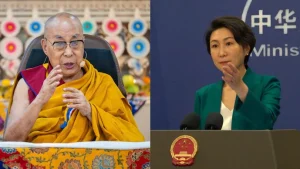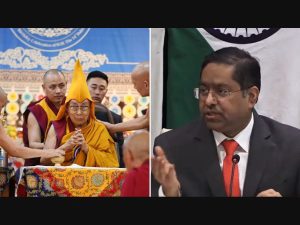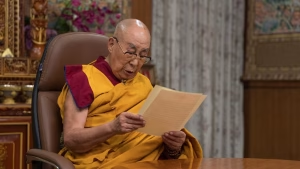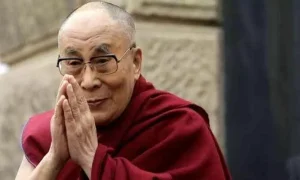New Delhi – The diplomatic tensions between India and China have escalated following a Dalai Lama China Warning issued by Beijing in response to remarks made by Indian Minority Affairs Minister Kiren Rijiju regarding the spiritual leader’s succession plans. The controversy has prompted official clarifications from both the Indian government and the minister himself, highlighting the sensitive nature of Tibet-related issues in bilateral relations.
The Triggering Incident
The Dalai Lama China Warning was prompted by Minister Rijiju’s public endorsement of the Dalai Lama’s authority to choose his successor. Speaking on Thursday, Rijiju had stated that no one else, besides the Dalai Lama himself, had the right to make decisions regarding his next reincarnation. This statement directly contradicted China’s position that any reincarnation must receive approval from Beijing.
The minister’s remarks came in response to a statement issued by the Dalai Lama on Wednesday, just days before his 90th birthday, in which he laid out his long-anticipated succession plans. The spiritual head of Tibetan Buddhism had declared in a video message delivered in Tibetan: “I am affirming that the institution of the Dalai Lama will continue. I hereby reiterate that the Gaden Phodrang Trust has sole authority to recognize the future reincarnation. No one else has any such authority to interfere in this matter.”
China’s Sharp Response


The Dalai Lama China Warning was delivered with characteristic firmness by Chinese foreign ministry spokesperson Mao Ning during the daily media briefing on Friday. She warned that India “should stop interfering in China’s internal affairs” to avoid harming the trajectory of bilateral ties.
“India should be clear about the anti-China separatist nature of the 14th Dalai Lama and honour its commitments on Xizang (Tibet) related issues,” Mao stated, referring to Tibet by its Chinese name. The Dalai Lama China Warning further emphasized that “India should exercise caution in its words and actions, stop interfering in China’s internal affairs with Xizang-related issues, and avoid impact on the improvement and development of the China-India relationship.”
Also Read: PM Modi Trinidad Visit: Prime Minister Receives Country’s Highest Civilian Honour
This stern Dalai Lama China Warning reflects Beijing’s consistent position that matters related to Tibet and the Dalai Lama’s succession are internal Chinese affairs that brook no foreign interference. The warning underscores the sensitivity of the Tibet issue in China-India relations and Beijing’s determination to maintain control over the succession process.
India’s Official Response


In response to the Dalai Lama China Warning, India’s Ministry of External Affairs (MEA) spokesperson Randhir Jaiswal provided a carefully crafted official response that sought to distance the government from Minister Rijiju’s personal remarks. Jaiswal stated that he was aware of “reports relating to the statement made by His Holiness the Dalai Lama about the continuation of the Dalai Lama institution.”
The MEA’s response to the Dalai Lama China Warning was diplomatically measured: “Government of India does not take any position or speak on matters concerning beliefs and practices of faith and religion.” This statement clearly indicated that India was not endorsing the Dalai Lama’s succession plans, despite the minister’s earlier remarks.
Jaiswal added that the “Government has always upheld freedom of religion for all in India and will continue to do so,” emphasizing India’s constitutional commitment to religious freedom while avoiding taking sides in the succession controversy that prompted the Dalai Lama China Warning.
Minister Rijiju’s Clarification
Following the Dalai Lama China Warning, Minister Rijiju moved quickly to clarify his position and distance his personal views from official government policy. Speaking to reporters in Delhi on Friday, he emphasized that his views were personal and not representative of the Government of India.
“I do not want to react to China’s statement,” Rijiju said in response to the Dalai Lama China Warning. “I am speaking as a follower. I am a devotee.” He further explained his position: “I believe in His Holiness the Dalai Lama. So from that perspective, I am saying that all over the world, those who believe in Dalai Lama ji wish that Dalai Lama ji himself will decide [on reincarnation]. This is the wish of the followers.”
The minister’s clarification following the Dalai Lama China Warning was unambiguous: “I am not speaking on behalf of the Government of India or in response to the Chinese government’s statement. I am not speaking on anyone’s behalf.”
China’s Position on Dalai Lama Succession


The Dalai Lama China Warning reinforced Beijing’s established position on the succession process. Chinese ambassador to India Xu Feihong wrote on social media that the selection must be carried out through the “Golden Urn lottery procedure.” While Beijing had ‘exempted’ the current Dalai Lama from this process, Xu stated that his successor “must follow the process that consists of search and identification in China, lot-drawing from the Golden Urn” and secure “central government approval.”
This position, which triggered the Dalai Lama China Warning, represents China’s attempt to control the succession process and ensure that the next Dalai Lama aligns with Beijing’s interests. The Chinese government views this as a matter of national sovereignty and internal affairs, hence the strong reaction to any perceived foreign interference.
Historical Context and Diplomatic Implications

The Dalai Lama China Warning must be understood within the broader context of India-China relations and the Tibet issue. India has hosted the Dalai Lama and the Tibetan government-in-exile since 1959, typically describing him as “a revered religious leader” who is “accorded all freedom to carry out his religious activities” in the country.
This diplomatic formulation has been India’s consistent response to Chinese protests, particularly regarding the Dalai Lama’s visits to Arunachal Pradesh. The Dalai Lama China Warning represents a continuation of this long-standing disagreement between the two nations.
Upcoming Diplomatic Engagements
The timing of the Dalai Lama China Warning is particularly significant given upcoming diplomatic engagements between India and China. Indian External Affairs Minister S Jaishankar is scheduled to visit China this month to participate in the SCO foreign ministers meeting beginning July 13. Prime Minister Narendra Modi is also expected to participate in the SCO leaders’ summit later this year.
The Dalai Lama China Warning adds another layer of complexity to these diplomatic interactions, potentially affecting the tone and substance of bilateral discussions during these multilateral forums.
Minister Rijiju’s Background and Position
Minister Rijiju, a practicing Buddhist from Arunachal Pradesh, has long expressed reverence for the Dalai Lama. His presence at the spiritual leader’s birthday celebrations as a Union minister is not unusual, given his religious beliefs and constituency. However, his explicit endorsement of the Dalai Lama’s position on reincarnation, which led to the Dalai Lama China Warning, raised eyebrows as India had previously refrained from commenting on succession matters.
Closing Statements


The Dalai Lama China Warning highlights the delicate balance India must maintain between its constitutional commitment to religious freedom and its diplomatic relations with China. While the immediate crisis has been managed through official clarifications, the incident underscores the enduring sensitivity of Tibet-related issues in India-China relations and the potential for even personal remarks by government officials to escalate into diplomatic incidents.

